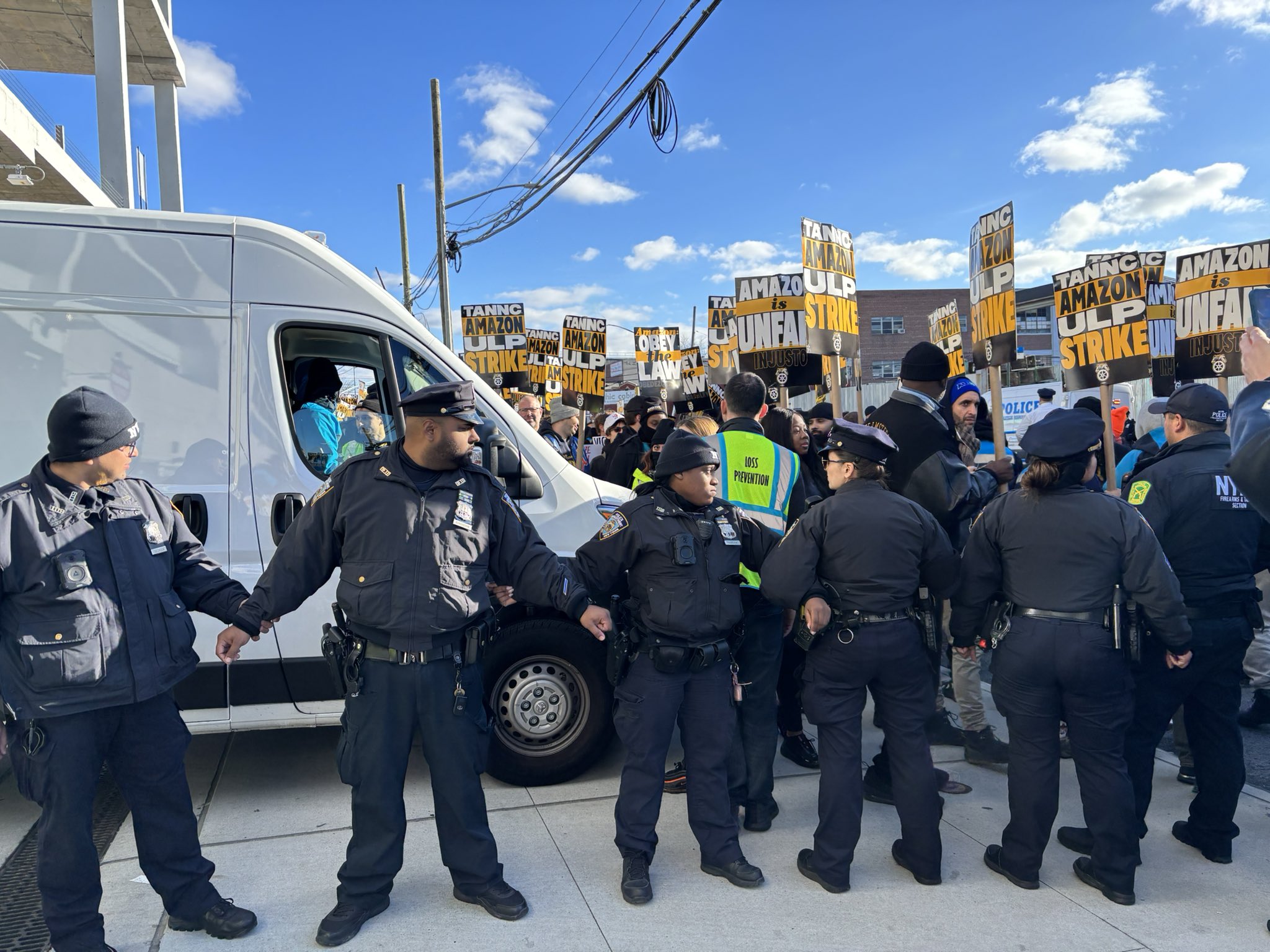
Andrew Strom is a union lawyer based in New York City. He is also an adjunct professor at Brooklyn Law School.
Two and a half years ago, thousands of workers at one of Amazon’s giant warehouses, known as JFK8, voted to unionize. Their victory generated huge amounts of attention across the country, and suddenly, one of the leaders of the organizing drive, Chris Smalls, was everywhere. Smalls became an overnight celebrity, and he even met with President Biden at the White House. The Amazon warehouse victory created a spark of hope that we might be witnessing a turning point for workers. Of course, even at the time, I cautioned that “without a lot more pressure on Amazon, the workers at JFK8 will be waiting a long time for their union contract.” Now, two and a half years later, it’s safe to say the spark has been extinguished. What happened, and what lessons can we learn?
The short answer as to what happened is that labor law is broken. When workers vote to unionize, an employer does not face an order to bargain until it has fully exhausted all of its appeals, a process that typically takes between three and five years. And once the order comes, the workers receive no compensation for the long delay. Instead, a court will simply issue a prospective bargaining order. So, an employer that can afford the attorneys’ fees has every incentive to raise even borderline frivolous objections, and keep appealing its defeats. It didn’t take any great insight to realize that this is exactly what Amazon would do.
What’s more surprising and disappointing is that the labor movement let the country forget about the JFK8 Amazon workers. Here’s where the labor movement needs to learn a lesson from MAGA. Think about the January 6th insurrectionists. As their cases worked their way through the legal system, Trump and his followers never forgot about them. Instead, at every opportunity they were celebrated as martyrs and victims. Trump energized his base by promising “justice” for the insurrectionists, and then he followed through on his promise by pardoning them all at the beginning of his term. In other words, Trump took a bunch of people who were on the losing side of an election, and who resorted to violence to prevent the peaceful transfer of power, and he turned them into heroes.
The Amazon workers could have provided a similar rallying cry for Democrats. In contrast to the law-breaking January 6th insurrectionists, the Amazon warehouse workers won their election fair and square despite going up against a behemoth. Amazon held captive audience meetings every 45 minutes, and it bombarded its workers with anti-union messages at every turn. The Amazon workers played by the rules, and the law failed them. The National Labor Relations Act promises workers that they have the right to form, join, or assist labor organizations, and they have the right to bargain collectively through representatives of their own choosing. But Amazon made a mockery of that promise. Kamala Harris never mentioned the Amazon workers on the campaign trail, nor did Democratic Senate candidates. The 2024 election could have been a contest between Democratic support for worker organizing versus Republican support for billionaires like Amazon’s former CEO, Jeff Bezos. If the JFK8 workers weren’t going to get a union contract, they could have at least been martyrs whose story would be repeated over and over to make sure that it never happened again. Every time someone sees an Amazon box or truck, they should have an image in their heads of the JFK8 workers who are still waiting for their opportunity to bargain collectively.
When the JFK8 workers won their election, there were stories proclaiming that unions were cool again. And for a moment it seemed like they might be. And, sure everyone likes a winner, but there are also endless examples where victims have inspired others to take action. Workers need to understand that our broken laws are what makes it hard to organize, and that those laws can be changed. One reason we are stuck with a President who takes the side of billionaires over workers is that we have failed to remember the story of the JFK8 workers and missed an opportunity to use that story to bring about change.









Daily News & Commentary
Start your day with our roundup of the latest labor developments. See all
January 26
Unions mourn Alex Pretti, EEOC concentrates power, courts decide reach of EFAA.
January 25
Uber and Lyft face class actions against “women preference” matching, Virginia home healthcare workers push for a collective bargaining bill, and the NLRB launches a new intake protocol.
January 22
Hyundai’s labor union warns against the introduction of humanoid robots; Oregon and California trades unions take different paths to advocate for union jobs.
January 20
In today’s news and commentary, SEIU advocates for a wealth tax, the DOL gets a budget increase, and the NLRB struggles with its workforce. The SEIU United Healthcare Workers West is advancing a California ballot initiative to impose a one-time 5% tax on personal wealth above $1 billion, aiming to raise funds for the state’s […]
January 19
Department of Education pauses wage garnishment; Valero Energy announces layoffs; Labor Department wins back wages for healthcare workers.
January 18
Met Museum workers unionize; a new report reveals a $0.76 average tip for gig workers in NYC; and U.S. workers receive the smallest share of capital since 1947.